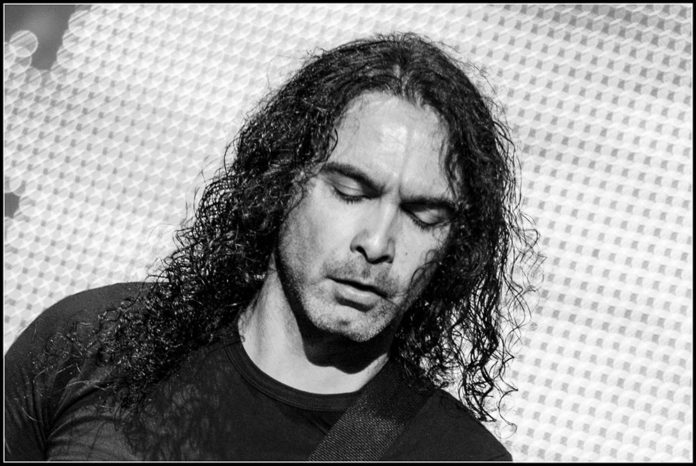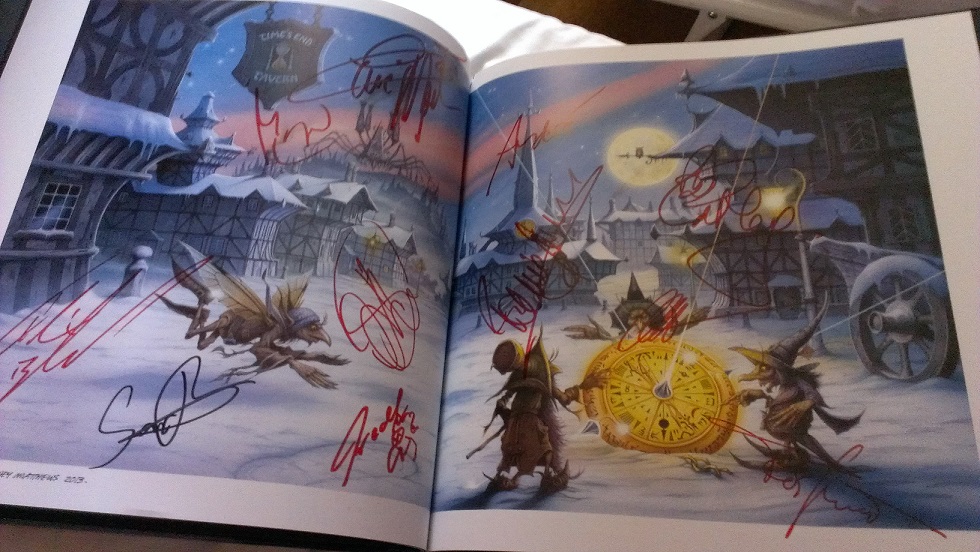I’m a huge fan of Avantasia.
Back in 2002 I had just found out about EdGuy, so I started to devour everything I could find that was somehow related to them. This quickly lead me to Avantasia and The Metal Opera I. I was fortunate, since later in the same year they released the second part (The Metal Opera II, in case you’re kind of slow) which was just as good, if not even better.
Even with my (back then) limited knowledge of the band, I knew that as a supergroup it was pretty much impossible to ever see them live. Then they released The Scarecrow and blew me away even more. For a number of reasons that I might get into at some point (( Look forward to my blogspots that nobody will give a fuck about! )) songs like Twisted Mind and The Scarecrow really hit home, and made me love the band even more.
It was then, in the aftermath of this great album, that a tour was announced. And it was more than what any of us had expected.
Since then I have seen Avantasia 3 times, two in a festival setting, and loved every single one of them. It doesn’t matter if Tobias Sammet is facing a crowd of 100,000 people, as in Wacken, or only a couple of thousands, as in their South American tour. The show that they’ll put up will be just as good every single time.
Although we were not scheduled to conduct an interview with Avantasia at the PPM 2013, the first show in this tour, the opportunity arose and we took it. We were fortunate enough to meet with Sascha Paeth, guitar player and producer of the band, who took us a little bit further into the magical and epic world of Avantasia.
You can check the video at the bottom of the page!
Metal Blast: Sascha, thank you so much for taking the time to do this interview.
You just released “The Mystery of Time”, an album that has received critical acclaim. How does it compare to the previous albums ?
Sascha Paeth: It is a more “fantastic” production, based a little bit more on orchestra work and keyboards. It’s more like a film score, to underline the whole story, the rock opera aspect, which was a choice on this one and I think it works out fine. Also, this gives the album a face of its own.
MB: One of the things that are well known about you is that you are a fan of 70’s rock. In The Mystery of Time there is a certain vibe of rock, even if it is undeniably of metal album; how much of this is because of your input?
S: Tobi and I sit together and work on the songs and arrangements, so he comes up with his ideas, I play some stuff on the guitar, I propose certain riffs or whatever and, obviously, there is an influence. But, also, he has a 70’s influence, so I think that we both like it and it just happens, we just do the stuff the way that we like it, it’s not planned.
MB: Tobias “blames” you for Avantasia touring, in the sense that it was not seen as something that would be taken on the road, and yet now it keeps going and going and going. As a matter of fact, I remember that the first time that I saw Avantasia I actually postponed a trip so as to make sure I wouldn’t miss this “one time opportunity”. Nowadays, thankfully, Avantasia tours more often. How much convincing does Tobias need now?
S: The first time we talked about touring was already before we recorded the album, as a continuation of Avantasia. I just told him “let’s do it!” and, when we started working on the songs we thought that it would be great to do it live, but he thought that it was not going to be possible, I just said “Why not? Let’s just try it. If you want it, then it’s going to work, and the people are probably going to like it, there will be a big variety of singers, so it’s not going to be boring. It’s going to be like a school excursion on the road, with lots of different people that you like, that have a talent; you can put together a band that is good and do everything the way you want, and it’s going to be great…”.
And it has worked out fine; he’s not blaming me anymore.
Originally, when we decided to do Avantasia, Tobi asked me to put the band together, so I was obviously choosing the people that I know and that I like, something that it’s very important for me because for this kind of thing you can’t just go for anybody, it has to be cool people that you can get along with, and that’s what I did. I chose the people that I’ve known for a long time:
Robert [Hunecke-Rizzo] who isn’t with us anymore (because now he’s a school teacher) was the bass player [during the Scarecrow World Tour]; The bass player that is here now, Andre Neygenfind, I’ve known him since I was 12, we had our first band together, first gig together… a long time ago, I don’t wanna say how many years!… 30 years!. I’ve known Miro [Michael Rodenberg], the keyboard player, since the first class of school, and we always did stuff together. I’ve known Oli [Hartmann] from before because we did albums together, but he doesn’t live in my surroundings. I brought in Amanda [Somerville] because she was living in my hometown (she’s from America originally, but she was living there) and we worked on some stuff together. Also, the singer (we have a new member) in the backing choirs and who will also sing some lead vocals is [Thomas Rettke] the singer of Heaven’s Gate, my old band; he’s a phenomenal singer and yet he hadn’t done any live work for 14 years, since we stopped Heaven’s Gate… and I think that he’s really going to kick ass; he did kick ass yesterday at the rehearsals at least!
I tried to put in everybody that I liked, and it’s just a little family.
The whole package together, that you can choose the people, musically, that are your friends; that you can do this because you want to do this, we’re not like a band that has to go on tour and promote themselves and do every show possible. We plan a tour, a good tour, with good shows and everything is great. We are travelling the world under good conditions, we play for quite some people, usually the shows are really packed and the response is great. It’s just great, what more do you want?
MB: How complex is to actually get the show on the road and how long does it take?
S: You have to start almost a year before you actually go on the road. From the first ideas to do it, you need almost a year; maybe you can do it in half a year, but I don’t think so. First you have to get the people together and then you have to start booking and then maybe you have some complications with people being on tour, you have to move stuff or even maybe exchange a member because it’s not going to work for someone because a tour is coming… until it’s all fixed it takes a while.
MB: In addition to being a musician and a composer you are a producer. What do you think mostly represents you?
S: It’s hard to tell what represents me, because when I’m doing something at the moment I think “Great! This is what I wanna do! It’s cool and I like it!“. I think that variety represents me.
I see myself more like a musician than a technician, but I do the technical work just because I can do it and it’s fun, but I see myself more in an artistical way, like someone that creates music.
MB: Is it hard for you to “produce” yourself?
S: Not anymore. I was too critical back in the day, but now when I produce myself I just do it, I just don’t care anymore. If I recorded myself 10 or 15 years ago I tried to make everything as perfect as possible, which makes you lose some of the emotional aspect; when I record myself now, we usually use the demos, the stuff that we record while we do the arrangements usually stays in the album.
I just to think that the more perfect it is, the better it is, but it’s not true. I mean, there has to be a raw element but that doesn’t mean that you can play out of time; you have to have a certain ability to forget about it and, obviously, the older you get and the more experienced you get the easier it is to just decide what is good and what is not good and to just let it go.
MB: As a producer, what would work are you most proud of?
S: There’s quite some stuff that I did that I’m proud of. I started with the first Angra, Angels Cry, a long time ago, and it was a gold record, and it was at the beginning of my career as a “producer”… or “arranger”, because I did arrangement and recording work that time, I wasn’t mixing yet.
Also, there’s Virgo, that I also did with Andre Mathos, the first Avantasia, The Scarecrow… there’s quite some stuff that I would say I can be proud of.
MB: Are there any chances that we will ever see the world of Aina again?
S: Do you mean live?
MB: No, just a new album!
S: We’ve talked about it but… It’s a little bit complicated, we have to see if this will happen again. I really can’t tell, there are no definite plans.
MB: And finally, what’s on your plate right now, what are you working on besides Avantasia?
S: To be honest, I just finished quite some things; I worked on an album for Asrai, an EP; and I am still working on an album for Crimes of Passion, it’s a band from Great Britain… they’re called COPUK now, they changed their name. I’m also working with a Sicilian singer, we’re doing an album that is not metal, although it can work in the metal field, it’s more classical, she’s a soprano; we’re not doing it in a super classical way, it’s a little bit poppy, it’s a good mixture, it’s going to be interesting.
So, yeah, I’m working on quite some stuff.
MB: Sascha, thank you very much for taking the time to do this interview. As a big fan of Avantasia it has been a pleasure.
S: You’re very welcome, enjoy the show!
Afterword: Sascha then proceeded to take my limited Edition Earbook of The Mystery of Time and got it signed by every single band member. That’s how incredibly nice this man is.
Support the band. Buy this awesome limited edition:
It’s only available from AMAZON UK, so hurry up and get it HERE!




[…] that Amsterdam concert, I was still in awe at his skills.While I had briefly met Michael Kiske when I interviewed Sascha Paeth at the PPM, I didn’t really know him, so I had my doubts as to how well the interview would go. Hell, […]
[…] the things that interested me about The Quantum Enigma was that you stopped your collaboration with Sascha Paeth and opted for the Dutch producer Joost van der Broek. What brought about that change, and what […]